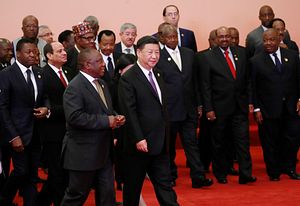The Forum on China-Africa Cooperation (FOCAC) concluded its third summit meeting in Beijing on Tuesday. The vast majority of Africa’s 55 countries sent their top leaders to join Chinese President Xi Jinping in Beijing, leaving “the continent … almost bereft of presidents,” as africanews put it (the same article also has a handy list of the leaders who did not make the trip – all six of them).
The near-universal attendance is a feather in China’s cap. Xi made a special point of welcoming three new members to this year’s FOCAC summit: the Gambia, Sao Tome and Principe, and Burkina Faso. All three had severed ties with Taiwan and established diplomatic relations with China since the 2015 summit – leaving eSwatini (formerly Swaziland) as the lone African country still recognizing Taiwan.
As is usually the case, the headlines coming out of FOCAC mostly centered on dollar signs. Xi Jinping’s announced $60 billion in new financing for Africa, but as Deborah Brautigam pointed out for the China-Africa Research Initiative Blog, the Chinese government is only actually putting up $50 billion — $10 billion less than pledged in 2015, at the previous FOCAC summit. The difference is supposed to come from private Chinese investments. The government-supplied total includes $20 billion in new loans and $15 billion in foreign aid, plus an additional $15 billion in two “special funds.” Brautigam notes that this marks a decrease in interest-bearing loans offered to Africa relative to 2015, while foreign aid (“grants, interest-free loans, and concessional loans”) comes in at “$5 billion per year, the highest level ever” offered to Africa from China.
In other words, China is giving more money to Africa via grants or interest-free loans, and less through interest-bearing credit lines. It’s no coincidence that this shift is occurring alongside global debates over the merits (and demerits) of Chinese debt, with some critics accusing Beijing of engineering “debt traps” for developing countries by offering loans that will be impossible to repay. In Africa in particular, China has been accused of both “debt trap” diplomacy and more general “neocolonialism” – both charges Chinese officials have vigorously refuted.
While the tone of official remarks at FOCAC were relentlessly positive, the topics discussed were inevitably shaped by these debates – and, more precisely, China’s attempt to change the narrative. In his speech at the opening ceremony, Xi highlighted eight major initiatives for future China-Africa cooperation: industrial promotion, infrastructure connectivity, trade facilitation, green development, capacity building, health care, people-to-people exchanges, and peace and security. The common thread throughout all eight areas is an expanded focus on building up local capacity. China pledged, for example, to help boost agricultural productivity, increase imports — especially of “non-resource products” — from Africa, and provide vocational training through Luban Workshops (see Lina Benabdallah’s helpful explainer here), government scholarships, and exchange programs.
None of these initiatives are new – building up Africa’s industrial capacity and exports also featured at the 2015 FOCAC summit, for example – but a renewed emphasis can help counter charges that China is taking more than it is giving in its dealings with African countries. It’s an implicit response to charges that China is mainly interested in profiting off Africa. Even the Belt and Road Initiative (BRI), Xi’s signature policy of global connectivity, is rebranded in this specific context as a way to “speed up African regional integration.”
“Making lives better for our people is what we aim to achieve in growing China-Africa relations,” Xi declared, “so we need to make sure our cooperation delivers real benefits to us both in China and in Africa.”
Xi even managed to turn Western critiques of China-Africa engagement into a positive: “The vigorous development of China-Africa cooperation has … inspired international partners to pay closer attention to Africa and increase their input into and cooperation with the continent,” Xinhua quoted Xi as saying.
Xi also made sure to get in his own, implicit critique of Western-style aid, by pledging to follow “five nos” in China’s Africa policy:
[N]o interference in African countries’ pursuit of development paths that fit their national conditions; no interference in African countries’ internal affairs; no imposition of our will on African countries; no attachment of political strings to assistance to Africa; and no seeking of selfish political gains in investment and financing cooperation with Africa.
China has always maintained that its model of engagement with Africa is “win-win” cooperation between equals – members of the global “South” and developing countries. That message is at the heart of Beijing’s policy of “non-interference” policy, which China contrasts with the “strings” attached (usually requiring political reform) to Western aid. The final point, though – “no seeking of selfish political gains” – drives home China’s desire to shed its growing image as a problematic partner for the development world.

































